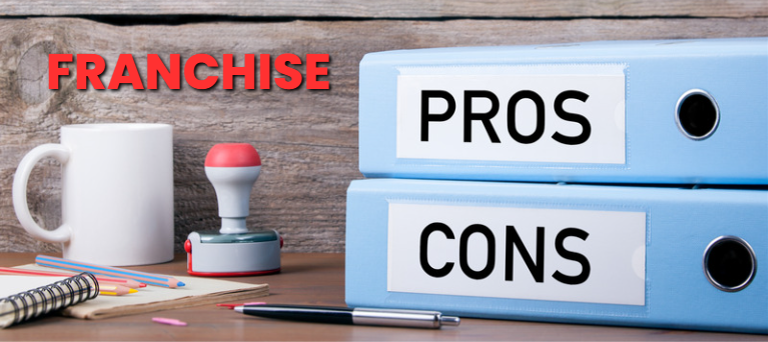Starting any business is a huge undertaking. There will be all the personal and financial considerations to consider regardless of whether you decide to go with a franchise or go it alone. So in this article, we’ll take a look at the pros and cons of franchising, as opposed to going it alone and, hopefully, you will be able to make an informed decision.
The Pros of Franchising
One of the safest ways to start your own company and fulfil your ambition to work for yourself is to purchase a franchise. Here’s why.
An Established Business Model
Through franchising, it is possible to start a new company using a tried-and-true business model, methodologies, systems, and a recognised brand. This will greatly speed up the process while lowering the risk, making it simpler to start a business. This is probably the most important pro of franchising!
Lower Rate of Failure
Acquisition of a Business Format Franchise provides an established, successfully tested concept to the investor. According to statistics, franchise owners have a much higher chance of success than those who launch their own independent businesses. While franchise owners have a 90% chance of surviving or doing better, the latter has an 80% chance of failing in the first few crucial years.
More Likely to be Approved for Financing

Banks are more likely to provide financing for the acquisition of a franchise than for the start-up of a new company. An established franchisor might even provide financial assistance to franchise owners if they have strong connections to particular banks, which they often do.
Franchisor Support
Franchise owners receive comprehensive, ongoing support through mentoring, training, assistance with statutory requirements, and problem-solving. Additionally, some franchisors offer assistance with lease negotiations and site selection. Small business owners frequently receive very little support or lack knowledgeable support staff.
Imagine you’re starting from scratch. There’s going to be no one to report progress to which for some may mean it’s all too easy to put things off until tomorrow. If you’re part of a franchise network, especially at the start of your journey, you may really benefit from a good launch and mentoring programme.
Recognized Brand
Franchise owners typically have the advantage of operating under a brand name and image that is already well-known, promoted, and respected on a national or international level. This decreases the cost of customer acquisition while accelerating local market adoption and business growth.
Reduced Inventory Costs
Franchise owners can make significant financial savings by taking advantage of the collective purchasing power of a franchise group to lower the cost of inventory and equipment. Typically, independent companies have less negotiating power with suppliers.
Client Credibility
Customers have faith in a franchise network’s individual locations to deliver dependability, value, consistency and service.
A Peer Network
Within the network of their franchise system, franchisees have many opportunities to discuss their problems and solutions with other like-minded business people. There’s nothing better than being able to get together with others who are in the same business that you are.
You can share ideas, talk about problems that you have, and brag about your accomplishments. They’ve been there and done it and will be some of the best people to advise and help during good times as well as bad.
Easier Staff Recruitment
For many independent small business owners, finding quality employees is an essential success factor. A franchise company with a well-known brand will have more recruiting power than an unidentified company. Many will have central systems in place to assist with advertising and other HR matters.
Exceptional Growth Opportunities
Franchise owners receive new business opportunities as a result of the franchisor’s ongoing research and development, which also elevates the value of the company. By raising the business’s resale value, the franchise business’ development itself generates equity for the franchise owner.
Furthermore, it may be that the franchisor obtains sales leads for franchisees centrally, depending upon the business model they use, meaning the franchisee can hit the ground running without having to do any of their own local marketing. An example of this might be a national home maintenance franchise which has a single central contact number and farms out leads to the franchisees who are local to the customer.
The Cons of Franchising
For some, the pros of buying and operating a franchise actually turn out to be cons.
Lack of Autonomy
This is the case for those of us who are just too independent and autonomous. One thing about franchising is that even though you are working for yourself, you still have a parent company that expects consistency and results from all of its franchisees. You may find this scrutiny or expectation to be too oppressive. It very much depends upon your personality and the type of franchise you choose.
Franchise owners will be restricted in their ability to make changes to the business model or to introduce new products or services. This can be a frustrating disadvantage for entrepreneurs who value creativity and innovation.
Legal Obligations
When you are deciding on a franchise to purchase, read the small print carefully to ensure that you are fully familiar with the terms and conditions and that you understand everything about the franchise.
It’s a big responsibility, as well as a risk, to sign a franchise agreement, usually for a number of years, especially if you find having this type of obligation oppressive.
If you don’t read your agreement carefully before signing on the dotted line and you find that you have made a mistake with your choice of franchise, you may be locked into that agreement for a period of years and find it impossible to get out of.
It’s highly advisable to have a franchise specialist solicitor look over your agreement and advise you prior to signing on the dotted line!
Franchisor Stability
As they say – a fish rots from the head, so if the top of a business is having problems, there’s a good chance that businesses further down the chain could suffer as well.
There is a trickle-down effect when it comes to franchisees and franchisors – if the franchisor is having financial problems due to bad management, this could adversely affect your business.
Franchisees must work diligently to maintain a positive reputation and to distance themselves from any negative publicity associated with the franchisor.
Disagreeing with Strategies

Some of the fees that you pay to the franchise are going to help pay for decisions that you don’t like or disagree with.
Even though you may not be in agreement with the franchisor about the things that are done to make the franchise grow or to help to fight the threats that your business runs into, like competition, you may find that while you have a say your opinion may not really count. When it comes to making management decisions, the majority vote usually wins.
You may also find that what works for other people may not work for you, for example, because of the location of your franchise. Unfortunately, this has little bearing on whether or not it will continue to be implemented. Usually, if it works for the majority it will continue to be used.
If a dispute becomes more serious the franchisor should have a clear dispute resolution process in place. If your franchisor is BFA Accredited you can approach them for assistance in dispute resolution.
The Belief That It’s Easy
One of the biggest mistakes that people make when they buy a franchise is that they don’t think anything can go wrong. They think that the money is just going to roll in with very little effort on their part, and they don’t require any management skills.
Even though there are systems that are in place that will help lessen the impact of not having a lot of experience, there are decisions that will have to be made every day when you are running your business.
The Franchisor Will Sell to Anyone
Hopefully, the franchisor of the business will sit down and make certain that you are well-suited for the job before offering you the chance to buy the franchise. They know that if the franchise fails, for whatever reason, it’s going to be harder to convince people who might purchase franchises in other locations that it’s a good business.
Of course, just because a franchisor sells you the franchise it doesn’t mean that they are completely confident in what you can do. Sometimes they just want to get a location sold and aren’t too bothered about future tunover. This is why doing due diligence is so important and, in this case, asking about turnover rates (or franchisee ‘churn’ as it often known) would be a crucial question to ask.
One Bad Apple Spoils the Bushel
When you are part of a franchise network, if there are problems with other franchises, people tend to stay away from yours because they are afraid that you may have the same problems. The sad thing is that the rumours don’t have to be true to cause a problem. If something is said about a franchise and the press gets hold of it, even if it’s not completely true, people are going to believe it and it could hurt your business.
No Say in Where You Buy Supplies
Usually, most of the franchisees buy all of their supplies from the same place – this isn’t necessarily because they want to but because it is written in their contract. When you own a franchise, for better or worse, you have to go by what the contract says and sometimes it says that you have to buy supplies from wherever the contract states. Whilst this can often be beneficial there may be occasions when you know you could get something similar or even better at a cheaper price.
Initial Costs and Fees
Starting a franchise can be more expensive than starting an independent business. In addition to the initial franchise fee, there may be ongoing fees and additional costs associated with adhering to the franchisor’s policies and procedures. These expenses can add up quickly and may significantly impact the franchisee’s profit margins.
Exit Strategy
Franchise agreements often have strict terms for termination or selling the business. This can limit the franchisee’s ability to exit the business or to sell it for a fair price. Franchisees often don’t think so far into the future but when the time comes are surprised by the conditions imposed because they didn’t fully understand the franchise agreement.
Conclusion
In conclusion, there are many factors to consider when deciding whether to start a business independently or to purchase a franchise. While franchises offer many benefits, such as an established business model and brand recognition, there are also drawbacks such as a lack of autonomy and legal obligations.
Ultimately, the decision to start a business should be based on careful consideration of personal goals, resources, and the specific franchise pros and cons of the opportunity.
Please note: None of the above constitutes financial and/or legal advice. We advise people to seek their own professional advice suited to their personal circumstances. You can find franchise specialist legal and accounting services in our directory.






